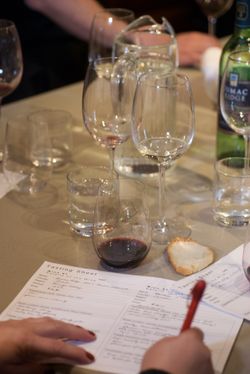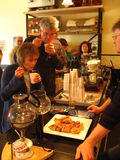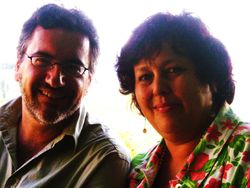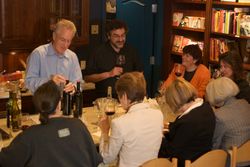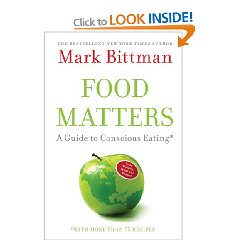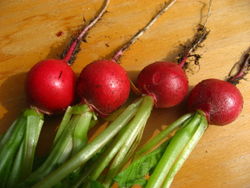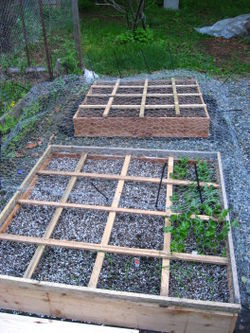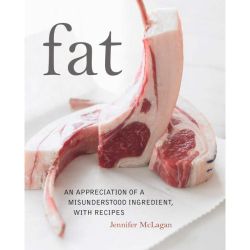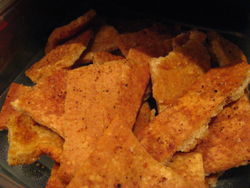 All You Can Eat is all about fat…well, for the most part. This podcast contains my interview with Jennifer McLagan, the author of Fat: An Appreciation of A Misunderstood Ingredient, with Recipes. We take a wander through the Granville Island Public Market in Vancouver, looking for examples of good fat, and actually find very little!
All You Can Eat is all about fat…well, for the most part. This podcast contains my interview with Jennifer McLagan, the author of Fat: An Appreciation of A Misunderstood Ingredient, with Recipes. We take a wander through the Granville Island Public Market in Vancouver, looking for examples of good fat, and actually find very little!
The picture at left shows one of the recipes I made from the book, crackling. It's pork skin, baked to a crisp with spices. Wonderful stuff!
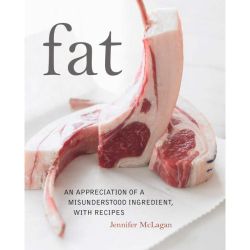 I have also used her recipes to make my own butter from whipping cream, (which leaves left over buttermilk for pancakes!) and very satisfying braised Asian pork belly recipe. For me Fat = Satisfaction.
I have also used her recipes to make my own butter from whipping cream, (which leaves left over buttermilk for pancakes!) and very satisfying braised Asian pork belly recipe. For me Fat = Satisfaction.
By clicking on this link you can order the book through Amazon.com and save 37% off the cover price. I get a tiny percentage from the sale, which slowly add up to a gift certificate, so I can buy more books. Thank you.
Oh, to listen to the podcast, just click here to listen to the mp3 file.
The rest of the podcast has plenty of suggestions of what to do if you want to live a more sustainable food life in 2009. Here are the suggestions in print for you to use or abuse as you see fit:
Part of making your food life more sustainable comes from growing your own food…but first some tips for people who don’t have the time or the space to do that:
Buy directly from the producer whenever possible…that means seeking out farmers markets. If there isn’t a farmers market in your community, or if it isn’t easily accessible, talk about car-pooling with your neighbours to go to a farmers market once a week. Maybe you could pool your resources as well, as the farmers may give you a better deal if you buy in bulk. This can work quite well if you want to share buying a side of beef, or a pig, for example.
Buy at the farm gate, or join a CSA, community supported agriculture. Basically you enter into a contract with a farmer well before the growing season starts. You pay a set amount, then share in whatever the farmer harvests each week during the growing season. You either pick up a box every week, or sometimes it is delivered. Small family? Some CSA’s offer a half-share.
You can start buying more organic produce, but be aware of where that produce is coming from. Buying organic raspberries from Chile in January may save chemicals from being used, but the carbon footprint of that product coming from thousands of miles away is large.
Buying in season from local farmers helps them stay in business, but then what do you do when there is 3 feet of snow in the ground? Live out of your freezer as much as possible. When I was growing up this is what we did. My mother canned peaches, pears, apple sauce, froze peas, beans, corn, stored the potato and carrot harvest in the root cellar. She made pickles and jams and tomato sauce. What she mostly bought in the winter were things like head lettuce and a few other fresh greens.
You say you don’t know how to can and preserve? Take a course. Check with community kitchens, community colleges and high schools to see if they have courses.
If you get involved in a CSA and start buying less processed food and you don’t know how to cook, take a cooking class. Or start up supper clubs for potluck dinners, great way to share food and pick up new recipes.
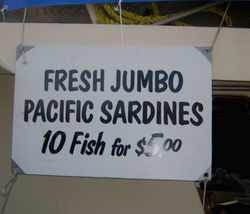 We’re supposed to eat more fish to have a healthier diet, but be careful about the kind of fish you eat. The Vancouver Aquarium, among other agencies, has a website and little cards full of information about which fish and shellfish are ‘good’ to eat from a sustainable harvest standpoint.
We’re supposed to eat more fish to have a healthier diet, but be careful about the kind of fish you eat. The Vancouver Aquarium, among other agencies, has a website and little cards full of information about which fish and shellfish are ‘good’ to eat from a sustainable harvest standpoint.
Gardening. No room? Try to grow something, even if it’s just a few pots of herbs on your balcony. Get a spot in a community garden. If your apartment or condo building has a lot of green space in the form of a lawn, see if some of it can be turned into a community garden. I saw this a lot in Italy, I’ve seen it at housing complexes in the Riley Park area of Vancouver, I’ve seen it on rooftops of condo complexes in Coal Harbour. Remember the old CBC rooftop garden?
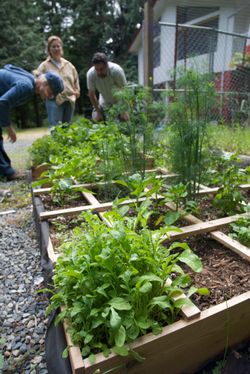 Have a big driveway? Following the advice of a gardening book, I built two small gardens right on top of my driveway! I grew potatoes, herbs, lettuce greens, beans, beets, green onions, bell peppers, carrots and more, in a space of just 32 square feet, two four by four gardens.
Have a big driveway? Following the advice of a gardening book, I built two small gardens right on top of my driveway! I grew potatoes, herbs, lettuce greens, beans, beets, green onions, bell peppers, carrots and more, in a space of just 32 square feet, two four by four gardens.
Try to get your seeds at an event such as Seedy Saturday, or buy from local seed companies like Dan Jason’s Salt Spring Seeds.
Join you local Slow Food Convivium, or create one in your own community.
Books to help you do this and even just to think about it:
Michael Pollan: In Defense of Food. In a follow-up to the highly successful The Omnivore’s Dilemma, In Defense of Food develops the Eater’s Manifesto. Eat food, not too much, mostly plants.
Barbara Kingsolver: Animal, Vegetable, Miracle, in which the popular poet and novelist details her family’s attempts to get back to the land over the course of a year. Along that same vein, The One Hundred Mile Diet, by BC authors Alisa Smith and J.B. Mackinnon.
All New Square Foot Gardening, by Mel Bartholomew, where I got all my advice and instructions for the gardens I made on my driveway.
And an older book from a guy who was ahead of the curve on all of this. John Robbins, and his book called The Food Revolution. This is the man who was the heir to the Baskin-Robbins ice cream fortune, who gave that all up and began traveling around the world talking about how your diet can help save your life and the world. This book came out in 2001 but the information in it is just as relevant today as it was then.
Some that I haven’t read but I think would be appropriate:
Taras Grescoe, Bottom Feeder, in which he examines fisheries around the world.
…and The Ethics of What We Eat: Why Our Food Choices Matter, by Jim Mason and Peter Singer. The authors examine three families' grocery-buying habits and the motivations behind those choices.
This link leads to The Ethics of What We Eat on amazon.ca and the page the book is on will lead you all kinds of different places for more books that will keep you reading for hours on this topic.
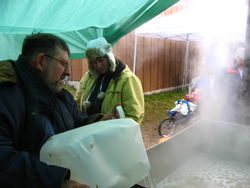 I've noticed that over the past few days at least a few people have been visiting my blog entry from last year's Big Leaf Maple Syrup Festival, no doubt looking for info on this year's fest.
I've noticed that over the past few days at least a few people have been visiting my blog entry from last year's Big Leaf Maple Syrup Festival, no doubt looking for info on this year's fest.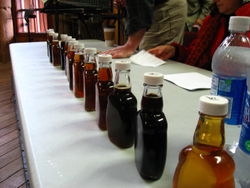 I get to be one of the judges in the Best Syrup Competition again this year, and apparently I will be sipping 23 different entries. Woo-hoo! Sugar overload….
I get to be one of the judges in the Best Syrup Competition again this year, and apparently I will be sipping 23 different entries. Woo-hoo! Sugar overload….
